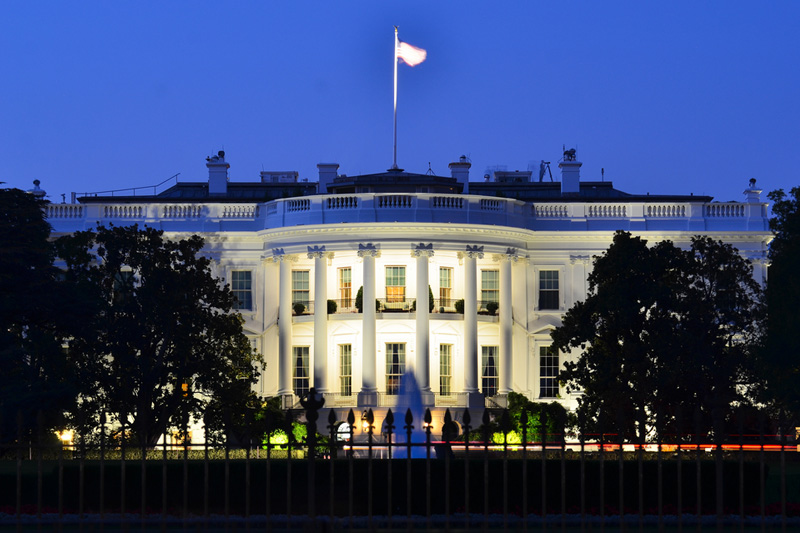
Investing.com -- President Trump will confer with his senior trade experts before deciding whether or not to implement the fresh round of import tariffs on Chinese goods, which are due to take effect on Sunday. The U.K. heads to the polls with Prime Minister Boris Johnson's Conservatives still - just about - expected to win a majority. Christine Lagarde presides over her first meeting as European Central Bank president but isn't expected to change interest rates. And the International Energy Agency warns that the extra production cuts by OPEC+ won't be enough to balance the world market for at least six months. Here's what you need to know in financial markets on Thursday, 12th December.1.
1. Trump due to meet with trade advisors
President Donald Trump is due to meet with his top trade advisors ahead of Sunday’s deadline for the next round of U.S. import tariffs on Chinese goods, according to various reports.
The White House has not confirmed the meeting, but the reports suggest Trade Representative Robert Lighthizer, Treasury Secretary Steven Mnuchin and White House advisors Larry Kudlow and Peter Navarro will be present.
The administration previously announced its intention to levy 15% tariffs on Chinese imports worth an estimated $160 billion annually. With no sign of a ‘phase-1’ deal with China being imminent, the meeting effectively boils down to a decision whether or not to delay the proposed measures. CNBC reported that officials had circulated talking points playing down the impact of the tariffs, which will cover many popular consumer goods.
2. No change seen at Lagarde's first ECB meeting, but Turkey, Brazil cut rates
Christine Lagarde will chair her first policy-making meeting of the European Central Bank’s governing council, the of which will be published at 7:45 AM ET (1245 GMT) as usual.
The focus, however, will be on Lagarde’s first at 8:30 AM ET (1330 GMT), in as much as nobody expects any change in policy so soon after Mario Draghi’s farewell package of easing measures in September.
Lagarde is expected to announce the start of a thorough review into how the ECB conducts policy, something that is likely to cover how it defines its inflation target, the policy tools it uses to pursue it and the way it communicates its decisions. The last of those may assume particular importance as Lagarde struggles to forge consensus on a bank bitterly divided over the resumption of quantitative easing.
Elsewhere, the left its key rate at -0.75% while Turkey’s cut its by 200 basis points, keeping the global trend toward easier monetary policy intact. Brazil’s central bank had also cut its key rate on Wednesday and, surprisingly, left the door open for further easing.
3. Stocks set to open slightly higher
U.S. stock markets are set to open modestly higher, building on equally modest gains after Fed Chairman Jerome Powell’s press conference on Wednesday.
By 6:20 AM ET (1220 GMT), were up 22 points or 0.1%, while and were also up 0.1%. The yield on the U.S. Treasury bond edged up to 1.80%.
Trading is likely to stay dependent on noise from Washington and Beijing about the looming tariff decision.
4. The Brexit election is here
The British head to the polls for a general election, and are expected to return the Conservative Party to power with a majority – according to spread-betting companies – of some 40 seats. That is at the lower end of Prime Minister Boris Johnson’s comfort zone.
The most recent polls have suggested the Tories hold a lead of 10 points over the left-wing Labour Party at a national level, but the U.K.’s ‘first-past-the-post’ electoral system means that the final result will depend on how a few dozen marginal constituencies (swing districts) vote.
Any majority, however small, will allow Johnson to pass his EU Withdrawal Bill immediately, formalizing the U.K.’s departure from the bloc. However, the smaller his majority, the easier it will be for hardline Brexiteers to derail subsequent negotiations on the U.K.’s trading relationship with the EU, which will have far-reaching long-term consequences for the U.K. economy and its markets.
5. IEA Warns of Oil Glut in H1 2020
The global oil market will stay oversupplied in the first half of next year despite the extra production cuts announced last week by the OPEC+ group, according to the International Energy Agency’s monthly report.
The Paris-based think-tank said that global oil inventories will still swell by 700,000 barrels a day even if all the countries signing up to the cuts comply fully with their commitments (something that hasn’t happened this year).
prices were still higher, supported by the Federal Reserve's perceived dovish outlook for the next year on Wednesday.
Elsewhere, Saudi Crown Prince Mohammed bin Salman finally achieved his wish as domestic funds pushed Saudi Aramco's (SE:) valuation up another 10% on its second day of trading, finally reaching the $2 trillion he always thought it was worth. In unrelated developments, Harold Hamm, the leading light of the U.S. shale industry, said he’ll step down as CEO of Continental Resources (NYSE:)
https://news.google.com/__i/rss/rd/articles/CBMia2h0dHBzOi8vd3d3LmludmVzdGluZy5jb20vbmV3cy9lY29ub215L3RvcC01LXRoaW5ncy10by1rbm93LWluLXRoZS1tYXJrZXQtb24tdGh1cnNkYXktMTJ0aC1kZWNlbWJlci0yMDM5NzE50gEA?oc=5
2019-12-12 11:21:00Z
52780490550204
Tidak ada komentar:
Posting Komentar